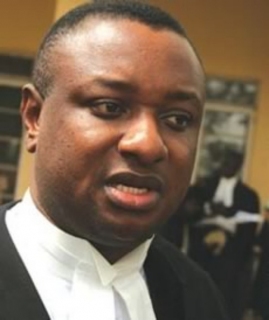
Festus Keyamo
By Festus Keyamo
I, Festus Keyamo, issue this Press Statement as the Lead Prosecutor in this case and on my behalf. The Commission may also issue its statement later.
The FCT High Court, sitting at Apo presided over by Justice S. B. Belgore today, Tuesday January 31, 2012, upheld the no-case submission made by the former Speaker of the House of Representatives, Dimeji Bankole and his Deputy, Nafada and discharged the two Accused persons.
This charge is only in relation to the allegations of obtaining illegal loans and the indiscriminate increase of the “allowances” and “running costs” from N27million to N42million per member, per quarter, under the leadership of the accused persons. The charge in relation to the contravention of the Public Procurement Act, to wit: inflation of prices of goods purchased for members of the House of Representatives is still pending before the Federal High Court, Abuja.
However, we disagree with the reasoning and conclusion of His Lordship Justice S.B. Belgore in the decision reached today on the following grounds:
1. The Court held that though it is morally wrong, morally indefensible and morally insensitive for the members of the House of Representatives led by Bankole and Nafada to have increased their “running costs” from N27million per quarter, per member, to N42million, it did not amount to a criminal offence but a moral wrong. The court reasoned that the legislature, being a different arm of government, the Revenue Mobilization Allocation and Fiscal Commission (RMAFC) cannot fix the “running costs” for members of the House of Representatives. They are at liberty to increase their “running costs” to whatever amount they so collectively wish.
Again the judge held that RMAFC can only fix “wages” and “allowances” and not “running costs” and that “running costs” do not qualify as “allowances”.
OUR DISAGREEMENT ON THIS POINT
Section 70 of the 1999 Constitution of the Federal Republic of Nigeria (as amended) states as follows:
“70. Remuneration
A member of the Senate or of the House of Representatives shall receive such salary and other allowances as the Revenue Mobilization Allocation and Fiscal Commission may determine.”
Consequently, in our opinion, it is wrong for a judge to allow a public officer to take money from the public till under any guise without reference to the RMAFC. Our respectful view is that “other allowances” as stated in the Constitution encompasses “running costs” as monies collected by public officers to offset expenses other than wages. The difference the judge tried to create is merely splitting of hairs.
2. The court held that Bankole and Nafada could not be held for criminal breach of trust because constitutionally, their powers do not include control of the Accounts of the House of Representatives, therefore they are not “entrusted” with those accounts. While the court agreed that Bankole was actually the approving authority regarding expenditure, in conjunction with the Clerk of the House of Representatives, the Court said this was only an illegal usurpation of the powers of the Clerk of the House of Representatives.
OUR DISAGREEMENT ON THIS POINT
3. The court held that the accused persons cannot be held guilty for theft because the funds in the accounts said to be the subject of theft were legitimately obtained as loans and disbursed to members.
OUR DISAGREEMENT ON THIS POINT
In our view, theft is committed when a property belonging to another is taken fraudulently without the consent of the other person. In this case, so long as monies were credited to the account of the House of Representatives which is an account of the Federal Government, they still needed to follow strict financial regulations in disbursing those amounts. To the extent that those financial regulations were not followed the “taking” is fraudulent and amounts to theft, in our view.
4. Lastly, the judge kept repeating that the loans have been fully paid back and so no crime has been committed.
OUR DISAGREEMENT ON THIS POINT
Apart from the fact that paying back of the loan does not repair the breach of the financial regulations by the accused persons, this is what PW 9 (Sefiya Musa, the Relations Manager of First Bank) said:
“PW9:- I have looked at A41. The bottom reading =N= 12 billion. That is the loan I am talking about. The loan has not been fully liquidated.”
Therefore, we do not know how the judge arrived at the conclusion that the loans have been fully paid back when the loan obtained from First Bank Plc remain unpaid as manifestly shown in the evidence of PW 9 above (as against that of UBA).
For these and other reasons, we are totally dissatisfied with the judgment and we are consulting with our client, EFCC on the possibility of an appeal.
Thank you.
FESTUS KEYAMO, ESQ.
Lead Prosecutor
No comments:
Post a Comment